Who dated ألفريد دي موسيه?
Caroline Jaubert dated ألفريد دي موسيه from ? until ?. The age gap was 7 years, 6 months and 5 days.
Aimée d'Alton dated ألفريد دي موسيه from ? until ?. The age gap was 0 years, 9 months and 9 days.
Louise Rosalie Allan-Despreaux dated ألفريد دي موسيه from ? until ?. The age gap was 0 years, 9 months and 21 days.
Rachel Félix dated ألفريد دي موسيه from ? until ?. The age gap was 10 years, 2 months and 17 days.
Anaïs Bosio dated ألفريد دي موسيه from ? until ?. The age gap was 2 years, 3 months and 16 days.
Louise Colet dated ألفريد دي موسيه from ? until ?. The age gap was 0 years, 2 months and 26 days.
George Sand dated ألفريد دي موسيه from until . The age gap was 6 years, 5 months and 10 days.
ألفريد دي موسيه
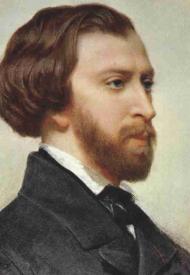
لوي شارل ألفرد دي موسيه -باتاي (بالفرنسية: Louis Charles Alfred de Musset-Pathay) (وُلد في 11 ديسمبر 1810 وتوفي في 2 مايو 1857) شاعر فرنسي ومسرحي وروائي. يُعرف بشعره كما يُعرف بكتابه: اعترافات طفل من القرن (La Confession d'un enfant du siècle)، وهو سيرة ذاتية له.
Read more...Caroline Jaubert
Caroline Jaubert, née Caroline d'Alton le à Coblence et morte le à Paris 9e, est la maîtresse et « marraine » d'Alfred de Musset, ainsi que la correspondante de Berryer et Heinrich Heine. Femme de salon, elle est notamment l'auteur de Souvenirs.
Read more...ألفريد دي موسيه

Aimée d'Alton
ألفريد دي موسيه

Louise Rosalie Allan-Despreaux
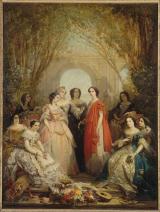
Louise Rosalie Allan-Despreaux (1810 – March 1856) was a French actress.
She was "discovered " by François Joseph Talma at Brussels in 1820, when she played Joas with him in Athalie. At his suggestion she changed her surname, Ross, for her mother's maiden name, and, as Mlle. Despreaux, was engaged for children's parts at the Comédie-Française. At the same time she studied at the Conservatoire. By 1825 she had taken the second prize for comedy, and was engaged to play ingenue parts at the Comédie-Française, where her first appearance in this capacity was as Jenny in L'Argent on 8 December 1826.
In 1831 the director of the Gymnase succeeded in persuading her to join his company. Her six years at this theatre, during which she married Allan, an actor in the company, were a succession of triumphs. She was then engaged at the French theatre at St. Petersburg, a scene praised by the Russian aristocracy and the Imperial family.
Returning to Paris, she brought with her, as Legouve says, a thing she had unearthed, a little comedy never acted until she took it up, a production half-forgotten, and esteemed by those who knew it as a pleasing piece of work in the Marivaux style: Un Caprice by Alfred de Musset, which she had played with success in French in St. Petersburg. Her selection of this piece for her reappearance at the Comédie-Française (1847) laid the cornerstone of Musset's lasting fame as a dramatist. In the following year his comedy Il ne faut jurer de rien was acted at the same theatre, and thus led to the production of his finer plays.
Among plays by other authors in which Mlle Allan-Despreaux won special laurels at the Comédie-Française, were Par droit de conquête, Péril en la demeure, La joie fait peur, and Lady Tartuffe. In the last, with a part of only fifty lines, and playing by the very side of the great Rachel, she yet held her own as an actress of the first rank.
Mlle Allan-Despreaux died in Paris, in the height of her popularity, in March 1856.
Read more...ألفريد دي موسيه

Rachel Félix
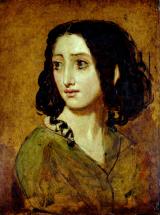
Rachel Félix (właśc. Elisabeth Félix, zwana Mademoiselle Rachel lub Rachel; ur. 21 lutego 1821 w Mumpf, zm. 3 stycznia 1858 w Le Cannet) – francuska aktorka teatralna, żyjąca pod koniec panowania Ludwika Filipa I i na początku rządów Napoleona III.
Urodziła się w wiejskiej karczmie, w niezamożnej rodzinie żydowskiej wędrownego handlarza Jakuba Felixa i jego żony Estery. Małżonkowie handlowali pasmanterią i mieli troje dzieci: Sarę, Rachelę i Rafaela. Rodzina Felix pochodziła z Alzacji, a więc Rachela od dzieciństwa władała i niemieckim, i francuskim oraz hebrajskim, który znała z nabożeństw w synagodze. Około 1831 cała rodzina znalazła się w Lyonie, gdzie mieszkała na poddaszu. Wszystkie dzieci śpiewały, deklamowały i tańczyły na ulicach pod kawiarniami i hotelami w celach zarobkowych. Pewnego dnia drobną, bosą i ubraną w podartą sukienkę Rachelę zauważył znany muzyk paryski Alexandre-Étienne Choron i poprosił ją, by coś zaśpiewała: dziewczynka zanuciła głębokim, tragicznym głosem jedną z hebrajskich pieśni religijnych. Pan Choron postanowił jej pomóc i skłonił rodziców do przeniesienia się do Paryża. Zamieszkali w dzielnicy żydowskiej, a Racheli Choron załatwił mecenasów, tak że mogła zacząć naukę śpiewu, deklamacji (uczyła się deklamacji z kamykami w ustach, tak jak Demostenes) oraz czytania i pisania, gdyż dotąd była analfabetką.
Od 17 roku życia Rachela występowała na scenie, najpierw w wodewilu i w mało znaczących rolach, ale krytycy teatralni zwrócili uwagę na jej talent. W 1838 r. przyjęto ją do sławnego teatru Comédie-Française, gdzie odniosła wielki sukces w tragedii Corneille’a „Horacjusz” w roli Kamili. Stała się gwiazdą, jednocześnie poznał ją Alfred de Musset i nawiązał z nią romans, ku wielkiej goryczy Aleksandra Walewskiego, który także się w niej głęboko zakochał.
Na scenie Rachela, występująca jako Rachel lub Mademoiselle Rachel, święciła gigantyczne sukcesy w różnych rolach w dramatach klasyków francuskich, jak Corneille i Racine. Największym jej triumfem była interpretacja roli Fedry w sztuce Racine’a (1842): obecny na premierze król Ludwik Filip osobiście udał się do garderoby divy, by jej pogratulować. Krytycy chwalili jej czystą i surową interpretację, bez patosu jej poprzedniczek, wspaniały głos, nienaganną dykcję, niezatarte wrażenie wywierała jej drobna i szczupła postać i ogromne, płonące oczy.
W życiu osobistym Rachel odznaczała się bardzo swobodnymi obyczajami (opowiadano o niej, że na premierze „Fedry” zapełniła pół parteru teatru swymi byłymi kochankami). Około roku 1842/43 rozpoczął się jej wielki romans z Aleksandrem Walewskim, który przez cały czas trwania związku musiał walczyć z jej „kokieterią” i tolerować jej sporadyczne już teraz spotkania z Mussetem lub synem Ludwika Filipa, księciem de Joinville. 3 listopada 1844 urodził się syn Racheli i Aleksandra, Aleksander Antoni Walewski. Ojcu nie przeszkadzało, że był w połowie Żydem i wnukiem wędrownych kramarzy, uznał go natychmiast i kochał bardziej od swych legalnych potomków. Rok później stosunki między Rachelą i Aleksandrem zaczęły się psuć, gdyż aktorka zapałała uczuciem do szesnastoletniego chłopca nazwiskiem Samson, syna dyrektora Comédie Française. Zerwanie między Rachelą a Walewskim nastąpiło w marcu 1847. W tym samym roku Aleksander poznał we Florencji hrabiankę Annę Marię Ricci i poślubił ją.
Po zerwaniu z Walewskim miała romans z Bertrandem, wnukiem generała Bertranda, który towarzyszył wraz z rodziną Napoleonowi w wygnaniu na Wyspie Św. Heleny, i urodziła syna Gabriela Wiktora w 1848, w tych latach miała też przelotny romans z Prezydentem – Księciem Ludwikiem Napoleonem – późniejszym Napoleonem III, a po nim z jego kuzynem ks. Napoleonem.
Zdrowie Racheli podkopały liczne podróże za granicę: do Rosji w latach 1853–1854 (i tam święciła triumfy), i do USA w 1855, gdzie jej sukcesy nie były tak wielkie z powodu niedostatecznej znajomości angielskiego. Jadąc do USA była już chora na gruźlicę. Po powrocie do Starego Świata udała się na kurację do Egiptu. W 1856 oddała syna Aleksandra Antoniego ojcu, który porozumiawszy się z żoną adoptował go (wychowany w wierze katolickiej chłopiec stał się przodkiem wszystkich dziś żyjących potomków Napoleona I). Ostatnie lata życia spędziła w Le Cannet w Południowej Francji, gdzie zmarła na gruźlicę w 37. roku życia. Na jej pogrzeb, który odbył się w żydowskiej kwaterze cmentarza Père-Lachaise, przybyło ok. 100 000 paryżan.
Read more...ألفريد دي موسيه

Anaïs Bosio
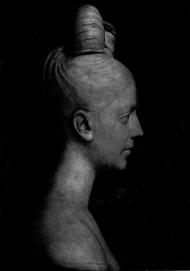
Angélique Félicité Anaïs Bosio, par son mariage marquise de La Carte, est une salonnière française née le à Paris et morte le à Pau.
Read more...ألفريد دي موسيه

Louise Colet
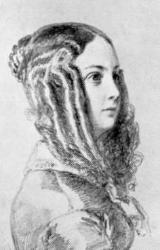
Louise Colet (French: [kɔlɛ]; 15 August 1810 – 9 March 1876), born Louise Revoil de Servannes, was a French poet and writer.
Read more...ألفريد دي موسيه

George Sand
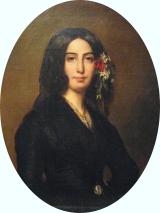
George Sand [ʒɔʁʒ sɑ̃d], nom de plume d'Aurore Dupin, par son mariage baronne Dudevant, est une romancière, dramaturge, épistolière, critique littéraire, journaliste et peintre française, née le à Paris et morte le au château de Nohant-Vic. Elle compte parmi les écrivains les plus prolifiques, avec plus de 70 romans à son actif et 50 volumes d'œuvres diverses dont des nouvelles, des contes, des pièces de théâtre et des textes politiques.
À l'image de son arrière-grand-mère, Louise Dupin, qu'elle admire, George Sand prend la défense des femmes, prône la passion, fustige le mariage et lutte contre les préjugés d'une société conservatrice.
George Sand a fait scandale par sa vie amoureuse agitée, par sa tenue vestimentaire masculine, dont elle a lancé la mode, par son pseudonyme masculin, qu'elle adopte dès , et dont elle lance aussi la mode : après elle, Marie d'Agoult signe ses écrits « Daniel Stern », Delphine de Girardin prend, en 1843, le nom de plume de « vicomte Charles de Launay ».
Malgré la misogynie de nombreux détracteurs comme Charles Baudelaire ou Jules Barbey d'Aurevilly, George Sand contribue activement à la vie intellectuelle de son époque, accueillant au domaine de Nohant ou à Palaiseau des personnalités aussi différentes que Franz Liszt, Frédéric Chopin, Marie d'Agoult, Honoré de Balzac, Gustave Flaubert, Eugène Delacroix, Henri Chapu, conseillant les uns, encourageant les autres. Elle a entretenu une importante correspondance avec Victor Hugo bien que ces deux grandes personnalités ne se soient jamais rencontrées.
Elle s'est aussi illustrée par un engagement politique actif à partir de , inspirant Alexandre Ledru-Rollin, participant au lancement de trois journaux : La Cause du peuple, Le Bulletin de la République, L'Éclaireur, plaidant auprès de Napoléon III la cause de condamnés, notamment celle de Victor Hugo dont elle admirait l'œuvre et dont elle a tenté d'obtenir la grâce après avoir éclipsé Notre-Dame de Paris avec Indiana, son premier roman.
Son œuvre est abondante et la campagne du Berry lui sert souvent de cadre. Ses premiers romans, comme Indiana (1832), bousculent les conventions sociales et magnifient la révolte des femmes en exposant les sentiments de ses contemporaines, chose exceptionnelle à l'époque et qui divisa aussi bien l'opinion publique que l'élite littéraire. Puis George Sand ouvre ses romans à la question sociale en défendant les ouvriers et les pauvres (Le Compagnon du Tour de France) et en imaginant une société sans classes et sans conflit (Mauprat, 1837 ; Le Meunier d'Angibault, 1845).
Elle se tourne ensuite vers le milieu paysan et écrit des romans champêtres idéalisés comme La Mare au diable (1846), François le Champi (1848), La Petite Fadette (1849), Les Maîtres sonneurs (1853).
George Sand a abordé d'autres genres comme l'autobiographie (Histoire de ma vie, 1855) et le roman historique avec Consuelo (1843) où elle brosse, à travers la figure d'une cantatrice italienne, le paysage artistique européen du XVIIIe siècle, ou encore Les Beaux Messieurs de Bois-Doré (1858) qui multiplie les péripéties amoureuses et aventureuses dans le contexte des oppositions religieuses sous le règne de Louis XIII. Vers la fin de sa vie, elle écrit une abondante œuvre théâtrale, restée largement inédite de son vivant.
Read more...